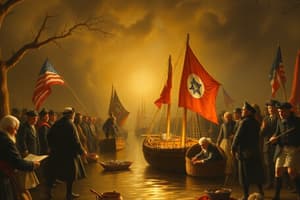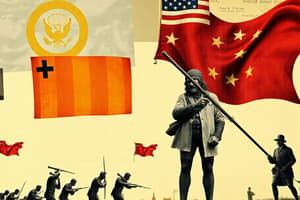Podcast
Questions and Answers
What was the cause of the Proclamation of 1763?
What was the cause of the Proclamation of 1763?
- The British government needed to support their army
- British leaders feared Native American resistance (correct)
- Colonists were protesting the Stamp Act
- Colonists demanded more land
What was the effect of the Quartering Act?
What was the effect of the Quartering Act?
Increased people's anger at Britain
What did the Stamp Act require colonists to do?
What did the Stamp Act require colonists to do?
Pay for an official stamp when buying paper items
What was a result of the First Continental Congress?
What was a result of the First Continental Congress?
What was one of the punishments outlined in the Intolerable Acts?
What was one of the punishments outlined in the Intolerable Acts?
What did the Townshend Acts impose duties on?
What did the Townshend Acts impose duties on?
What was the effect of the Tea Act?
What was the effect of the Tea Act?
What sparked the Boston Massacre?
What sparked the Boston Massacre?
Who were the Loyalists?
Who were the Loyalists?
What did the term 'Patriot' refer to?
What did the term 'Patriot' refer to?
What is Parliament?
What is Parliament?
What does debt mean?
What does debt mean?
What does the slogan 'No taxation without representation' mean?
What does the slogan 'No taxation without representation' mean?
What is a boycott?
What is a boycott?
Who were the Sons of Liberty?
Who were the Sons of Liberty?
What are writs of assistance?
What are writs of assistance?
Flashcards are hidden until you start studying
Study Notes
Proclamation of 1763
- Issued to prevent further conflict with American Indians after the French and Indian War.
- Banned British settlement west of the Appalachian Mountains, affecting the Ohio River Valley.
Quartering Act
- Enacted as punishment for the Boston Tea Party.
- Required colonists to provide housing for British soldiers, escalating tensions between Britain and the colonies.
Stamp Act
- Introduced in 1765 to raise funds for the British Army through taxes on paper products.
- Sparked immediate protests and led to the formation of the Sons of Liberty, a secret society resisting British control.
First Continental Congress
- Convened in response to the coercive measures following the Boston Harbor closure.
- Drafted the Declaration of Rights, outlining colonial grievances to be presented to King George III.
Intolerable/Coercive Acts
- Implemented as a reaction to the Boston Tea Party.
- Included closing Boston Harbor, restricting communication, enforcing the Quartering Act, and allowing British officials to be tried in Britain.
Townshend Acts
- Imposed duties on various goods including glass, tea, and paper, enforced through writs of assistance for searching suspected smugglers.
- Led to widespread boycotts of British products as colonists resisted these laws.
Tea Act
- Allowed the British East India Company to sell tea directly to the colonies, aiming to reduce smuggling.
- Provoked the Boston Tea Party, where colonists dumped 340 chests of tea into the harbor in protest.
The Boston Massacre
- Due to resentment towards British troops, tensions escalated in Boston.
- On March 5, 1770, a violent confrontation resulted in British soldiers firing into a crowd, killing five colonists.
Loyalist
- Colonists who remained loyal to Britain during the American Revolution, opposing the independence movement.
Patriot
- Colonists advocating for independence from Great Britain, actively participating in revolutionary activities.
Parliament
- The supreme legislative body in Britain, responsible for creating laws affecting the colonies, often against colonial interests.
Debt
- Refers to the monetary obligations owed by individuals or governments, significant in the context of funding the British military.
"No taxation without representation"
- A slogan reflecting the colonial belief that Parliament had no right to tax them without their consent, voiced by leaders like James Otis and Samuel Adams.
Boycott
- A collective protest strategy where colonists refused to purchase British goods, aiming to disrupt British trade and influence policy change.
Sons of Liberty
- A clandestine group opposing British rule through protests and boycotts, instrumental in mobilizing colonial resistance.
Writs of Assistance
- Legal documents allowing British officials to search colonial property for smuggled goods, infringing on colonists' rights and privacy.
Studying That Suits You
Use AI to generate personalized quizzes and flashcards to suit your learning preferences.




